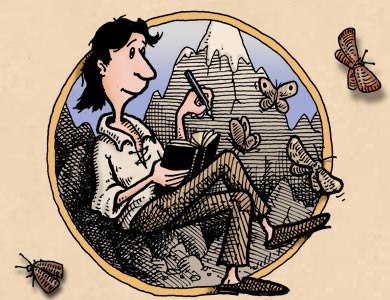
The Poet & the Princess
ONCE UPON A TIME A YOUNG POET was in love with a princess. He wandered right up to the top of a mountain, and there amongst the cloudy mist he met a strange little man, sitting on a rock. The little fellow was wrapped up in a baggy black coat and wearing a black hat whose brim was so wide and so floppy that it obscured his face entirely. He greeted the poet and offered to teach him something useful in return for something that the poet would never miss and had never even used.
Now, everybody knows that the little people are tricksy and treacherous, and if one should ever offer you a deal it is always best to put your hands firmly in your pockets and just politely say, “No.” But the poet was something of a daydreamer (as they almost always are), and this time he really did have his head in the clouds. So he agreed to the trade because it was a good deal: how could he mind parting with something that wouldn’t be missed? And if he’d never used it anyway, he reasoned, how important could it have been?
The little man flapped his arms and climbed down off his seat, and did an awkward little jig all the way around him before clambering back onto his rock. Then, using his magic, he took the second half of the poet’s life. The poet felt nothing—after all, he never really knew that he was going to have it, and so far he’d never ever used it.
In return and true to his word, the little man taught the poet something useful: a special, useful knot that could join things to a person’s heart.
“You have to be careful to use knots for their proper purpose,” he began. “Let me give you an example.” And while he watched the poet practice (you can’t just be shown a knot: you have to repeat it again and again before you know you’ve got it right), he told him a story. It was a story that rambled here and rambled there, more like a tangle than a tale, about kings and crows and nothing at all, and ended where it had started: nowhere.
For a while silence fell on the mountain top.
“Is that it?” asked the poet. “Isn’t there an ending?”
“Young poet,” replied the man curtly, “not all stories have an ending, yet. Just like: not all poems have to rhyme.” And with that the man disappeared in a flapping and a flurry of mist, and all that was left was a coat and a hat.
When the poet came back down with his new, useful knot, he was happy enough. This was partly because he had no idea what he'd lost (except, of course, that he knew he didn’t miss it); partly because now he realised that he didn’t have to make his poems rhyme any more (which had always been the hardest part); but mainly because it's unusual for poets to know anything useful at all and now that he knew a useful knot, that made him feel oddly special.
Soon afterwards, the poet collected precisely four hundred butterflies, and he carefully tied each one to his heart with a silk thread using the knot that the strange little man had taught him. Well, actually he was a poor poet, so he used moths instead of butterflies, but never mind, because they better suited his shabby clothes and long, uncombed hair, and also they were sluggish during the day and hence easier to catch.
So one night, wrapped in his cloak of attendant moths, he strode into the palace and read a poem: a poem he'd written for the princess, about the princess, to the princess. She was so delighted that she clapped her pretty hands together. This startled the moths, every one of them, such that they took off all together and fled in fear like four hundred gasps, their wings all a-flutter, up into the sky, striving for the impossible refuge of the moon. The poet's heart of course was carried with them because silk, like love, is surprisingly strong; but the rest of the poet stayed behind because gravity, like truth, has a strength that cannot be denied.
It's only fair to say that the princess was upset—very upset—and she never clapped her hands again for as long as she lived (in fact, when she became Queen, she forbade applause throughout her kingdom). But the poet's heart still dances, in the sky, in the air, towards the moon, because that, after all, was where it had always belonged.
